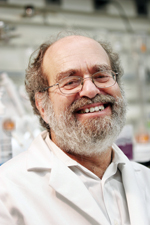Irv Epstein wins $600K from HHMI to expand the Science Posse program
Program will continue to make science education exciting and accessible

Irv Epstein
Four years ago, chemistry professor Irv Epstein won a highly-competitive million-dollar grant from the nation’s largest private funder of science education to start a science program at Brandeis specifically designed to attract and retain talented, underrepresented students in college-level science. Today, the “million dollar professor” won another grant for $600,000 from the Howard Hughes Medical Institute (HHMI) to continue and broaden the Science Posse program, the only one of its kind in the nation.
Epstein’s program, developed in collaboration with the NY-based Posse Foundation, recruits, trains, and provides mentoring and other services for “posses” of 10 inner-city students each year to prepare them for studying science at Brandeis. A network of high school teachers and leaders of extracurricular science programs recommend talented students, who participate in an eight-month precollege training program that builds teamwork and enhances students’ academic and leadership skills.
The students also attend a two-week, on-campus “boot camp” the summer before matriculation, introducing them to the rigors of studying science. After the students start classes, they are linked with a graduate student mentor, who meets with them regularly, both individually and in groups. The success of both the program and Epstein’s strategy is amply evident: The Science Posse program has now recruited three cohorts of 10 students each from New York City high schools. Of the 20 who are currently enrolled, all are still planning to major in science. Eight have made the dean's list, and the overall Science Posse GPA is well above a B. Science Posse scholars have been accepted at prestigious summer research programs at schools like Yale, Case Western, Tufts, and the University of Utah.
“As a result of the Posse program, minority enrollment in introductory science courses has increased well beyond the number of Posse students,” said Epstein. “Our preliminary surveys show that both minority and majority students experience a learning environment that sets high standards for their success.” Indeed, several Science Posse students have become campus leaders, and a group of them recently founded a Brandeis chapter of SACNAS (Advancing Hispanics/Chicanos and Native Americans in Science).
“With our new HHMI grant, we will continue the Science Posse with a focus on evaluation and dissemination,” said Epstein. “During the next four years, we will follow the first three Science Posse cohorts through graduation, tracking their academic progress, their attitudes toward and persistence in science, and their postgraduate career plans, as well as their impact on the attitudes of students, faculty, and administrators at Brandeis.”
Along with continuing to improve the recruitment, selection, precollege training, boot camp, and on-campus mentoring aspects of the program, Epstein and his Science Posse colleagues will initiate several new programs over the next five years. With the help of Boston-based Let's Get Ready, an organization that has successfully expanded college access for low-income students by utilizing undergraduates as tutors and mentors, Epstein plans to create a science-oriented version of the program that will serve 30–50 high school students from Boston and nearby Waltham, Massachusetts, each year. The program will include college preparatory mentoring (with some Science Posse students serving as mentors), a Saturday morning science lecture and discussion series by Brandeis faculty, and internships at the Discovery Museums in Acton, Massachusetts.
Another initiative will adapt a regional version of the United States Biology Olympiad, normally for high school students, targeting Boston- and Waltham-area seventh and eighth graders. Working with Science Posse scholars and other Brandeis undergraduates, Epstein and his colleagues will develop examination materials, including laboratory exercises, suitable for middle school students. The two-tiered competition will involve several hundred middle school students, with the top 50 advancing to the “finals” at Brandeis, where they will participate in a “cool science” day led by the Posse students.
“HHMI is committed to funding education programs that excite students’ interest in science,” says HHMI President Robert Tjian. “We hope that these programs will shape the way students look at the world—whether those students ultimately choose to pursue a career in science or not.”





